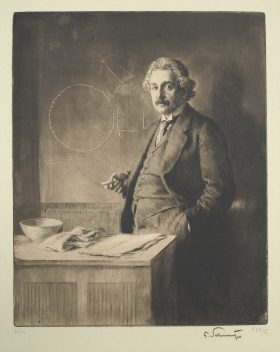"Einstein was no space alien," laughs Harvard University physicist and science historian Peter Galison. "He was a man of his time." All of his 1905 papers unraveled problems being worked on, with mixed success, by other scientists. "If Einstein hadn't been born, [those papers] would have been written in some form, eventually, by others," Galison believes.
What's remarkable about 1905 is that a single person authored all five papers, plus the original, irreverent way Einstein came to his conclusions.
For example: the photoelectric effect. This was a puzzle in the early 1900s. When light hits a metal, like zinc, electrons fly off. This can happen only if light comes in little packets concentrated enough to knock an electron loose. A spread-out wave wouldn't do the photoelectric trick.
The solution seems - light is particulate. Indeed, this is the solution Einstein proposed in 1905 and won the Nobel Prize for in 1921. Other physicists like Max Planck (working on a related problem: blackbody radiation), more senior and experienced than Einstein, were closing in on the answer, but Einstein got there first. Why?
It's a question of authority.
"In Einstein's day, if you tried to say that light was made of particles, you found yourself disagreeing with physicist James Clerk Maxwell. Nobody wanted to do that," say Galison. Maxwell's equations were enormously successful, unifying the physics of electricity, magnetism and optics. Maxwell had proved beyond any doubt that light was an electromagnetic wave. Maxwell was an Authority Figure.
Einstein didn't give a fig for authority. He didn't resist being told what to do, not so much, but he hated being told what was true. Even as a child he was constantly doubting and questioning. "Your mere presence here undermines the class's respect for me," spat his 7th grade teacher, Dr. Joseph Degenhart. (Degenhart also predicted that Einstein "would never get anywhere in life.") This character flaw was to be a key ingredient in Einstein's discoveries.
"In 1905," notes Galison, "Einstein had just received his Ph.D. He wasn't beholden to a thesis advisor or any other authority figure." His mind was free to roam accordingly.
In retrospect, Maxwell was right. Light is a wave. But Einstein was right, too. Light is a particle. This bizarre duality baffles Physics 101 students today just as it baffled Einstein in 1905. How can light be both? Einstein had no idea.
That didn't slow him down. Disdaining caution, Einstein adopted the intuitive leap as a basic tool. "I believe in intuition and inspiration," he wrote in 1931. "At times I feel certain I am right while not knowing the reason."
Although Einstein's five papers were published in a single year, he had been thinking about physics, deeply, since childhood. "Science was dinner-table conversation in the Einstein household," explains Galison. Albert's father Hermann and uncle Jakob ran a German company making such things as dynamos, arc lamps, light bulbs and telephones. This was high-tech at the turn of the century, "like a Silicon Valley company would be today," notes Galison. "Albert's interest in science and technology came naturally."
Einstein's parents sometimes took Albert to parties. No babysitter was required: Albert sat on the couch, totally absorbed, quietly doing math problems while others danced around him. Pencil and paper were Albert's GameBoy!
He had impressive powers of concentration. Einstein's sister, Maja, recalled "even when there was a lot of noise, he could lie down on the sofa, pick up a pen and paper, precariously balance an inkwell on the backrest and engross himself in a problem so much that the background noise stimulated rather than disturbed him."
Einstein was clearly intelligent, but not outlandishly more so than his peers. "I have no special talents," he claimed, "I am only passionately curious." And again: "The contrast between the popular assessment of my powers… and the reality is simply grotesque." Einstein credited his discoveries to imagination and pesky questioning more so than orthodox intelligence.
Later in life, it should be remembered, he struggled mightily to produce a unified field theory, combining gravity with other forces of nature. He failed. Einstein's brainpower was not limitless.
Neither was Einstein's brain. It was removed without permission by Dr. Thomas Harvey in 1955 when Einstein's mother Pauline had famously worried that baby Einstein's head was lopsided. (Einstein's grandmother had a different concern: "Much too fat!") But Einstein's brain looked much like any other, gray, crinkly, and, if anything, a trifle smaller than average.
Detailed studies of Einstein's brain are few and recent. In 1985, for instance, Prof. Marian Diamond of UC Berkeley reported an above-average number of glial cells (which nourish neurons) in areas of the left hemisphere thought to control math skills. In 1999, neuroscientist Sandra Witelson reported that Einstein's inferior parietal lobe, and area related to mathematical reasoning, was 15% wider than normal. Furthermore, she found, the Sylvian fissure, a groove that normally extends from the brain to the back, did not go all the way in Einstein's case. Might this have allowed greater connectivity among different parts of Einstein's brain?
No one knows.
Not knowing. It makes some researchers feel uncomfortable. It exhilarated Einstein: "The fairest thing we can experience is the mysterious," he said. "It is the fundamental emotion that stands at the cradle of true art and true science."





